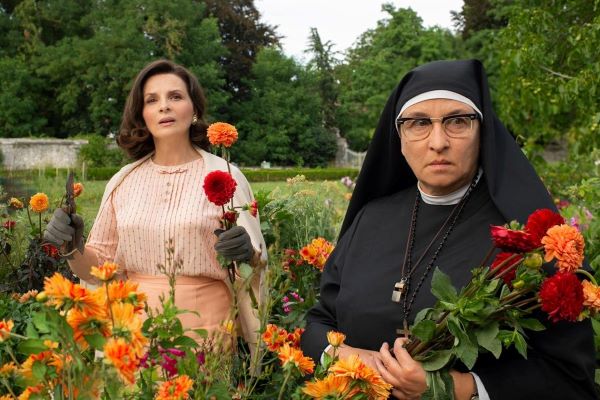The ’60s weren’t quite as swinging in rural France if Martin Provost’s farce of sexual politics is too be believed. Juliette Binoche heads the cast as the headmistress of a school teaching the virtues of cooking, cleaning, sound financial nous, and conjugal compliance. It’s an attitude that is ripe for mockery, but too obvious for satire. This hasn’t stopped Provost and co-writer Séverine Werba from having a good attempt. Unfortunately, the broad strokes approach achieves nothing more than mild amusement, and assumes that a buttoned-up Binoche and a fist-pumping bout of emancipation are enough to keep things ticking along. It is just about enjoyable enough to be gently distracting, but little more than that.
Paulette van der Beck (Binoche) runs a school for good housekeeping in Alsace, an institution priding itself on turning out dutiful and selfless wives. For many years they’ve drilled their rigid principals into their young charges like the tenets of a religion. Even by 1968 though, numbers at this old-fashioned establishment have dwindled. Worse is to follow as Robert, her useless lecher of a husband (François Berléand) chokes to death on a rabbit fricassee. It turns out that while Paulette has played the perfect Hausfrau, Robert has drank and gambled the school’s finances into the dirt. Facing potential closure, Paulette’s archaic worldview is challenged by a long-stifled attraction to suave banker André (Edouard Baer) and the enticing news filtering though from Paris about the revolutionary student revolt.
One might raise an eyebrow at a film about feminist awakening, even one as breezy as this, being co-written and directed by a man. To be fair to Provost, he has a proven track record of female-centric work such as Séraphine and Violette. They are however resolutely dramatic works and his hand is far less steady on the tiller here. How to Be a Good Wife is lumbered with a sense of flippancy that undercuts any serious issues it attempts to deal with, particularly later on when it shrugs off the drastic actions of a distraught student. Frothy needn’t equate to inconsequentiality, but Provost simply doesn’t handle the balance. It misses the deft touch that François Ozon brought to similar themes in Potiche. Early Almodóvar would have gobbled this up too. Its biggest issue however is also likely to be its biggest draw.
Bluntly, How to Be a Good Wife is simply not a good vehicle for the considerable talents of Juliette Binoche. It is far too broad and farcical and she suffers as she did in a similar role in Bruno Dumont‘s shambolic Slack Bay. At least in that mess she was part of a larger ensemble. Here, she’s the head of central trio, but co-stars Noémie Lvovsky as the vaguely psychotic nun Marie-Thérèse, and maverick comic actress Yolande Moreau as Robert’s sister Gilberte fare better with the tone. Binoche is certainly capable of convincing in heightened, almost absurd roles; see the witchy, almost Wicked Queen vibe she brought to the lunatic chill of Claire Denis‘ High Life, for example. But her comedic touch is better suited to restraint, such as in Denis’ Let the Sunshine In and Hirokazu Koreeda‘s The Truth.
Faring better are the impressive young supporting cast fulfilling a normal coming-of-age narrative in parallel to Paulette’s sudden late bloom. Marie Zabukovec is the spit of a young Bardot as the rebellious ringleader Fuchs. Anamaria Vartolomei and Pauline Briand share a believably tentative romance, and Lily Taieb does well with a jarringly serious storyline. Depending on your view, the relative reserve of their performances are either a necessary counter-measure to the flamboyance of the adults, or simply highlight just how broadly the other aspects seem in comparison. The aim is surely to hint at an anti-authoritarian streak separate to the central message of female liberation, it is just far too clumsy.
In mitigation, it certainly looks the part. Cinematographer Guillaume Schiffman, as he did in another whimsical comedy of sexual politics, Populaire, captures something of peak Jacques Demy in his eye-popping pastel colours, and Binoche’s costumes would almost be enough to have Jackie Onassis spontaneously resurrect in delight. Even as it canters along merrily enough, it would take the most generous of viewers to stay on board come the all-singing, all-dancing finale. With satire so obvious it barely qualifies as such and its lead floundering in the midst of its saccharine quagmire, How to Be a Good Wife would be better off left in spinsterhood.
Screening as part of the French Film Festival UK 2020
